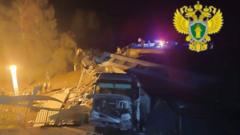The Global Terrorism Index reports that the Sahel region is now responsible for over half of global terrorism deaths, with insurgent groups like IS-Sahel and JNIM gaining ground amid political turmoil.
Sahel Emerges as Global Terrorism Epicenter, Accounting for Half of All Terror Deaths

Sahel Emerges as Global Terrorism Epicenter, Accounting for Half of All Terror Deaths
The latest Global Terrorism Index reveals the Sahel region experiences a staggering rise in terror-related fatalities, exacerbated by political instability and expanding jihadist influences.
The Sahel region of Africa has been identified as the "epicentre of global terrorism," with the latest Global Terrorism Index (GTI) revealing that it now accounts for more than half of all terrorism-related fatalities worldwide. The report states that 3,885 of the 7,555 global terror deaths occurred in this semi-arid area south of the Sahara Desert. Despite a downward trend in global terrorism deaths since a peak in 2015, the Sahel has witnessed an alarming nearly tenfold increase in deaths since 2019 as extremist groups intensify their focus on the region.
Issued by the Institute for Economics and Peace, which specializes in conflict research, the GTI describes terrorism as the "threatened or actual use of illegal force and violence by a non-state actor" to achieve a political, economic, religious, or social end through fear. Spanning parts of ten countries—Burkina Faso, Mali, Niger, Cameroon, Guinea, The Gambia, Senegal, Nigeria, Chad, and Mauritania—the Sahel is characterized by some of the highest birth rates globally, with a substantial portion of its population under the age of 25.
While the West has seen an uptick in lone-actor terror incidents, the Sahel has been marked by the rapid growth of militant jihadist organizations. The GTI highlights two main groups: the affiliate of the Islamic State in the Sahel and Jama'at Nusrat al-Islam wal Muslimeen (JNIM), associated with al-Qaeda. Analysts suggest these groups are vying to introduce new legal frameworks based on Sharia law while competing for dominance over land and influence.
An alarming development noted by the GTI report is the significant territorial expansion of IS-Sahel in Mali since recent coups in 2020 and 2021, largely in eastern regions bordering Burkina Faso and Niger. Both militant groups have also increased their recruitment efforts, even involving child soldiers. The vulnerability of local communities often leaves individuals with little choice but to align with these extremist factions.
The GTI attributes the rise of terrorism in the Sahel to political instability and weakened governance, where prolonged neglect of citizen needs has allowed insurgent activities to flourish. Characteristically referred to as Africa's "coup belt," the region has undergone six successful military coups since 2020 alone, including instances in Mali and Burkina Faso. Although these military juntas initially promised a tougher stance against insurgents, insecurity has instead intensified under their governance.
Illicit economic activities, such as kidnapping, cattle rustling, and drug trafficking, sustain jihadist operations in the Sahel. The region has transformed into a critical corridor for cocaine trafficking from South America to Europe, leading to financial gains for militant groups. While some factions engage in direct criminal enterprises, others prefer to extract revenue by imposing taxes or offering protection services, embedding them deeper into local communities.
Niger, notable as a significant uranium producer, and various artisanal gold mines, remain highly coveted by insurgents. Following the recent wave of coups, Sahel nations have shifted allegiances from traditional Western allies to Russia and China for military assistance against these militant threats. However, the effectiveness of this new support framework remains questionable.
As the Sahel grapples with the rise of violent extremism, the GTI warns of potential spillover effects into neighboring nations, with countries like Togo already experiencing increased attacks and fatalities, mainly within areas adjacent to Burkina Faso. Analysts express concerns that further expansion of jihadist groups could soon extend into coastal West African states, deepening the crisis in a historically volatile region.




















